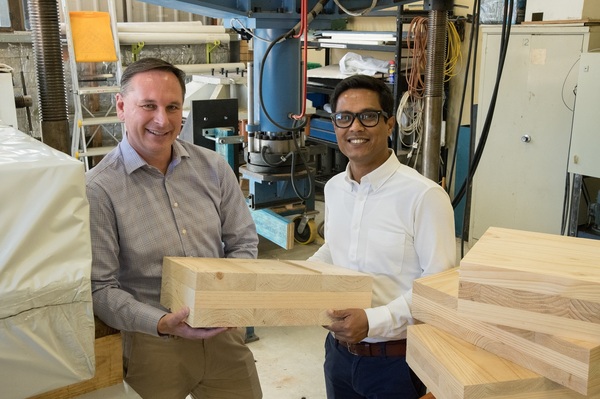
A Geelong-based team has begun an investigation that could reveal the full potential of cross-laminated timber (CLT).
Deakin University associate professor Mahmud Ashraf will lead the team assessing more 3.6 tonnes of the construction material.
Assoc Prof Ashraf said the researchers would also explore various approaches to connecting the large format panels for achieving robust and efficient structural solutions.
“We want to improve our understanding of the load-bearing capacity of this new type of CLT to ensure it is used in the broadest range of applications in the most efficient way.”
The investigation could reveal the full potential of the innovative and environmentally-friendly material, Assoc Prof Ashraf said.
The results would increase the understanding of how CLT panels work together as a system and provide information to improve construction methods, he said.
The team will test the strength limits of Australian CLT at Deakin’s school of engineering at its Waurn Ponds campus.
CLT is mass-engineered timber consisting of layers laminated together in opposing directions.
The material’s high strength-to-weight ratio meant builders could use it in long spans allowing for a simplified building structure, Assoc Prof Ashraf explained.
The ability to supply prefabricated panels also added potential for cost savings and eliminating scaffolding in the building process, he said.
While the material has been in use in Europe for several decades, Australian-made CLT is a relatively new product.
Because of different timber species used in production worldwide, researchers needed to verify the relative performance of Australian-made CLT, Assoc Prof Ashraf said.
Unlike Europe, Australian manufactures made CLT using different grades of timber lamellas, he said.
XLam Australia supplied Deakin with 3.6 tons of mass CLT panels as part of a recently-formed collaboration.
The panels vary in thickness from 105mm to 145mm, the most commonly used in mass timber construction.
XLam’s Paul Kremer said the research work at Deakin will help the industry continue to push the boundaries of what is possible.
“Supporting the work of the Deakin research team will drive innovation which we believe is a worthwhile investment,” Dr Kremer said.
“We plan to continue our work with Deakin to support further research efforts.”






